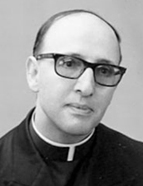

According to his testimony, Manuel Antunes had already distinguished himself in those early days: "Of all the students on the course, he excelled at writing and even published an article in Brotéria”, the Society’s journal. In Craveiro’s classes, the students were required to read “many books" in order to "formulate their opinion on them, which led to magnificent dialogues between the teacher and students”, representing crucial moments for the future literary critic (cit. Idem, p. 37). He then completed his second and final year of the Juniorate in Science at the Seminário dos Jesuítas de Braga[Jesuit Seminary in Braga].
Manuel Antunes then advanced to a new phase in Jesuit education, comprehending two areas of study, one in Philosophy and the other in Theology. In 1943, he graduated in Philosophy from the Instituto Beato Miguel de Carvalho [Blessed Miguel de Carvalho Institute] (from 1947 the Pontifícia Faculdade de Filosofia [Pontifical Faculty of Philosophy]), currently the Faculdade de Filosofia de Braga da Universidade Católica [Braga Faculty of Philosophy of the Catholic University]) with the dissertation Panorama da Filosofia existencial de Kierkegaard a Heidegger [Overview of Existential Philosophy from Kierkegaard to Heidegger]. This document was lost but has been partially restored by the articles published in Brotéria. Between 1943 and 1946, he decided to proceed to the Magisterium, a stage related to spiritual growth, usually occupied by teaching or missionary work. He had his first teaching experience in the Seminário da Costa in Guimarães where, for four years, as a trainee teacher, he taught Latin Rhetoric, Greek Language, Greek Language and Literature, Latin Rhetoric and Latin Humanities in the so-called Curso Superior de Letras [former Faculty of Arts] (upon completion of the Novitiate). Finally, as the Order offered its students the possibility of pursuing at least one higher degree course abroad, Manuel Antunes was sent to the Faculty of Theology in Granada (Spain) where he received priestly ordination in 1949 and ended the first phase of his theological studies the following year, with the highest mark. He accomplished this theological and spiritual training in Namur (Belgium), completing the year of the so-called Third Probation in a probationary retreat with an international group.
Upon his return to Portugal, he taught at the Escola Apostólica [Apostolic School] and at the Noviciado da Companhia de Jesus [Novitiate of the Society of Jesus] (located in Soutelo, near Braga), between 1951 and 1955. Meanwhile, in 1954, he was admitted to the solemn profession of the Four Vows in the Order of St. Ignatius of Loyola, the entrance rite in which an oath of obedience to the Pope is taken. In 1955 he was appointed editor of Brotéria and sent to Lisbon.
